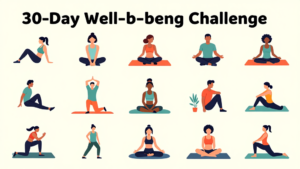8 Simple Tips For Stress Management

In today’s fast-paced world, stress has become a common issue affecting millions of individuals. Whether it’s due to work pressure, personal relationships, or everyday challenges, feeling overwhelmed is something many can relate to. Managing stress is not just about feeling better in the moment; it plays a crucial role in maintaining overall mental health.
This article aims to provide you with 8 simple tips for stress management that everyone can implement. These practical solutions can help you regain control and foster a sense of well-being in your daily life.
Recognize Your Stress Triggers
Understanding your personal stress triggers is the first step toward effective stress management. Stress triggers can vary widely among individuals, so being aware of what specifically affects you is crucial.
https://90ad7cp1n440npd4ucngy0wqwv.hop.clickbank.net
Common Stress Triggers
Some common stress triggers include:
| Trigger | Typical Response |
|---|---|
| Work deadlines | Increased anxiety |
| Family issues | Emotional overwhelm |
| Financial concerns | Restlessness |
Importance of Recognizing Triggers
Recognizing these triggers is essential because it allows you to develop strategies to cope effectively. By identifying what causes your stress, you can take proactive steps to manage your emotional responses. This awareness can lead to healthier coping mechanisms and ultimately reduce your overall stress levels.
Practice Mindfulness and Meditation
Mindfulness and meditation are powerful tools for managing stress. They promote mental clarity and emotional stability. “Meditation is not about stopping thoughts, but recognizing that they are just thoughts and letting them go.” This practice can help you cultivate a sense of peace amid life’s challenges.
To begin your mindfulness practice, start with simple techniques. Try focusing on your breath for a few minutes each day. Notice the sensations as you inhale and exhale. Alternatively, you can practice mindfulness while engaging in daily activities, such as eating or walking, by fully immersing yourself in the experience.
Statistics reveal the effectiveness of meditation. Research indicates that regular meditation can reduce stress levels by up to 30%. Moreover, practitioners often report improved focus and emotional resilience.
If you’re new to meditation, consider using beginner-friendly apps like:
Headspace
Calm
Insight Timer
These resources can help guide you on your journey toward a calmer mind.
Engage in Regular Physical Activity
Regular physical activity is a powerful ally in stress reduction. When you exercise, your body releases endorphins, known as the “feel-good” hormones. This natural response can help improve your mood and alleviate feelings of stress.
Various types of physical activities can significantly help manage stress levels. Consider incorporating the following exercises into your routine:
Walking or jogging
Yoga or Pilates
Cycling
Swimming
Group sports or fitness classes
Engaging in these activities can not only boost your physical health but also enhance your mental well-being. According to studies, regular exercise can reduce anxiety and depression symptoms by up to 40%. Furthermore, individuals who exercise regularly report feeling more relaxed and less stressed overall.
By making physical activity a priority in your daily life, you can create a powerful buffer against stress and foster a positive outlook.
Adopt a Balanced Diet
A balanced diet plays a crucial role in managing stress effectively. The foods we consume can influence our mood and overall mental health. Nutrient-rich foods can help reduce stress levels and improve our resilience to daily challenges.
Key nutrients that help combat stress include:
| Food | Nutrient |
|---|---|
| Leafy Greens | Magnesium |
| Fish (e.g., Salmon) | Omega-3 Fatty Acids |
| Nuts and Seeds | Vitamin E |
| Whole Grains | B Vitamins |
| Dark Chocolate | Antioxidants |
Incorporating these foods into your daily meals can be simple. Start your day with a smoothie that includes spinach and a banana. For lunch, enjoy a quinoa salad topped with nuts and grilled salmon. Snack on dark chocolate or a handful of nuts when cravings hit.
By making these small dietary changes, you can significantly improve your stress management and promote a healthier mindset.

Ensure Adequate Sleep
https://8dabclv-x82qhk2dqnqiluaxa5.hop.clickbank.net
“Quality sleep is not a luxury; it’s a necessity for effective stress management.” Sleep is vital for our mental and physical well-being. When we don’t get enough rest, our ability to cope with stress diminishes significantly.
Studies show that individuals who sleep less than seven hours per night are more likely to experience higher stress levels. Ensuring adequate sleep can help reduce anxiety, improve mood, and enhance overall resilience.
To improve your sleep quality, consider the following tips:
Establish a regular sleep schedule by going to bed and waking up at the same time daily.
Create a relaxing bedtime routine to signal your body that it’s time to wind down.
Limit exposure to screens at least an hour before bed to minimize blue light disruption.
Make your sleep environment comfortable and dark.
Avoid caffeine and heavy meals close to bedtime.
By prioritizing sleep, you can enhance your ability to manage stress effectively, leading to a healthier, more balanced life.
Set Healthy Boundaries
Setting healthy boundaries is crucial for reducing stress. Boundaries define what is acceptable for you and help protect your mental and emotional space. When you establish clear limits, you create a buffer against overwhelming situations and demands.
Examples of healthy boundaries include saying ‘no’ to additional work when you’re already overwhelmed, or setting aside specific times for personal activities. These boundaries allow you to prioritize your well-being and manage your time effectively.
Communicating boundaries can be challenging, but it is essential. Start by being clear and direct about your needs. Use “I” statements to express how certain situations affect you. For instance, say, “I need some quiet time to recharge after work,” instead of blaming others.
“The power of saying ‘no’ can transform your life for the better.” Remember, setting boundaries is not selfish; it’s a necessary part of self-care. By establishing and communicating your boundaries, you empower yourself to manage stress more effectively.
https://8dabclv-x82qhk2dqnqiluaxa5.hop.clickbank.net
FAQ on Stress Management
Managing stress is essential for maintaining mental health. Here are some common queries and their concise answers to help you navigate stress management effectively.
What are the best techniques for managing stress? Techniques like mindfulness, regular physical activity, and ensuring adequate sleep can significantly reduce stress levels. Incorporating these practices into your daily routine is key.
How can I identify my stress triggers? Start by keeping a journal. Note situations that make you feel stressed. Over time, patterns will emerge, helping you understand your specific triggers.
Is exercise really effective for stress relief? Yes, physical activity releases endorphins, which improve mood. Aim for at least 30 minutes of moderate exercise most days to experience these benefits.
What role does nutrition play in stress management? A balanced diet rich in fruits, vegetables, and whole grains can enhance your overall well-being. Nutrients like omega-3 fatty acids and magnesium are particularly effective in reducing stress.
How can I improve my sleep quality? Establish a consistent sleep schedule, create a relaxing bedtime routine, and limit screen time before bed to enhance sleep quality.
https://www.cdc.gov/
https://blissfullway.com/the-science-behind-group-meditation-and-its-impact-on-mindfulness/
Conclusion
In summary, managing stress effectively involves recognizing your triggers, practicing mindfulness, engaging in physical activity, adopting a balanced diet, ensuring adequate sleep, and setting healthy boundaries. Each of these strategies contributes to a holistic approach to stress management.
It’s important to remember that taking action is crucial. Implementing even a few of these tips can lead to significant improvements in your mental well-being. Start small, be consistent, and watch how these changes positively impact your life. You deserve to live a stress-free, balanced life!






